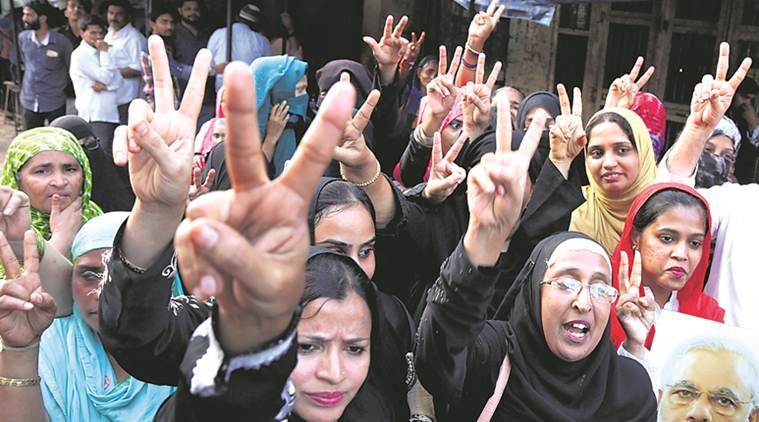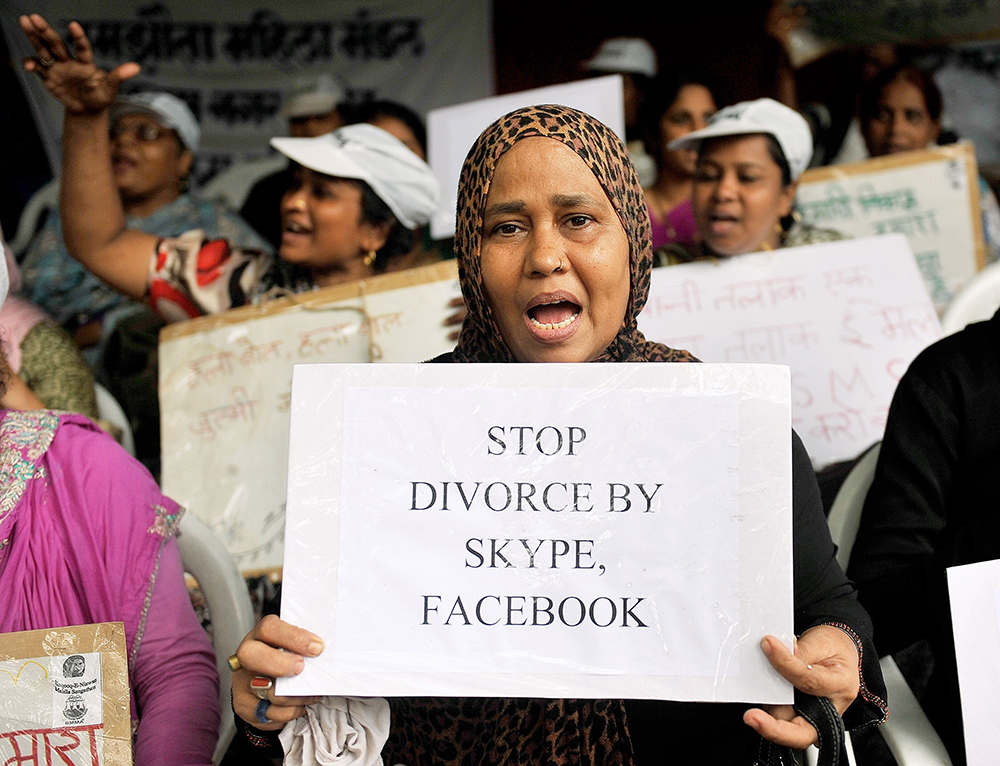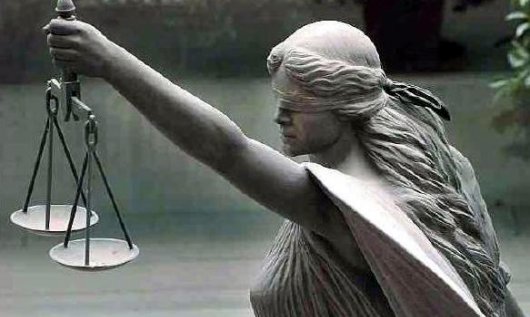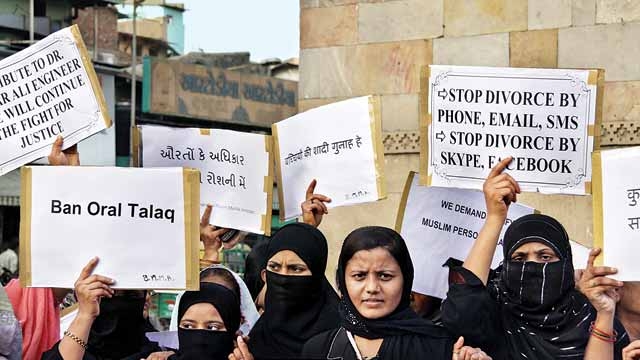
Psychoanalysis has always been a bit harsh, if not downright suspicious of altruism. However, the spectacle of the overwhelming concern for Muslim women from Prime Minister Modi to U.P. Chief Minister Yogi Adityanath and the whole gamut of Hindu organisations does seem to strain credulity a trifle. Perhaps, the caution of psychology to step back and examine our narcissistic feelings may have a point.
All of us like to feel good about ourselves. Rescuing “poor Muslim women” from “villainous” men of their own community is a measure par excellence for fulfilment of ‘rescue’ fantasies and the accompanying heady feelings. It adds an irreproachable and unanswerable dimension to the demonising of the males of the ‘other’ community as part of a certain agenda. The general formula is the construct of the virile black male as lusting after white women in white supremacist ideology; and likewise of the Muslim male as lusting, if not raping ‘pure’ Hindu mothers and sisters.
However having said that, the holding of the practice of instant triple talaq as unconstitutional and invalid by the majority verdict of the Supreme Court is most welcome and long overdue. The waiting for reform within the community, while having many takers, has the flavour of Samuel Beckett’s ‘Waiting for Godot’. Dr. Asghar Ali Engineer having devoted his life to reform within the Dawoodi Bohras died without making much of a dent in the powerful Syedna’s autocratic powers. The Honourable Supreme Court of India enjoying a paramount position in the polity played a crucial role in the context of rights of individuals and authoritarian religious practices.
The case of Sardar Syedna Taher Saifuddin Saheb versus State of Bombay, AIR 1962 SC 853 is telling as to the pivotal role of the courts in the interplay of religious practices and the rights of the individual. The Bombay Prevention of Excommunication Act, 1949 by Section 3 decreed that: “… no excommunication of member of any community shall be valid and shall be of any effect”. The preamble to the Act states that in keeping with the changing times and in the public interest, it was expedient to stop the practice of excommunication prevalent in certain communities. The definition of “community” contained in Section 2 of the Act included the included the Dawoodi Bohras.
The Syedna, the religious head of the denomination challenged the constitutional validity of the Act on the ground that it violated its fundamental rights guaranteed by Articles 25 and 26 of the Constitution. The majority judgment of the five-judge Constitution Bench of the Supreme Court in its wisdom pronounced the impugned Act void as making excommunication invalid infringed the right of the community under Art. 26(b)to manage its affairs. The judgment declares that the fact that the rights of an excommunicated person would be affected is of no consequence. Strangely, without offering any reasoning the verdict laid down that ex-communication could not be said to prejudicial to public order, morality and health, nor could it be said to be a law “providing for social welfare and reform” which are permissible grounds for imposing restrictions on the right under the Constitution.
Justice Sinha, the Chief Justice to the institutions’ credit gave a dissenting judgment more in tune with the spirit and ethos of the Constitution. Sinha held that the actions of the religious head touching upon the civil rights of the members of the community were justiciable and liable to interference by the legislature and the judiciary. The Act was held to fall within the saving provisions of Article 25(2)(b) as a measure of social welfare and reform and valid.
It is good to keep in mind that even after the passage of more than half-a-century since Sinha’s lone dissenting judgment in 1962, the present majority judgment outlawing triple talaq in a suo moto petition taken up by the Apex Court titled Muslim Women’s quest for Equality versus Jamaiat-Ulma-I-Hind, the verdict is a close 3:2 ruling. A wafer thin single judge margin indicates that it could well have gone the other way.
The frame of discourse of the arguments advanced and the discussion in the triple talaq judgments seem discordantly medieval. Gender discrimination and equality fall by the wayside. The discourses are in the nature of – talak-e-biddat or triple talaq as invalid solely because it is arbitrary and does not give any reasons. Reasons like that the woman is not docile and obedient or is of ‘bad’ character are in tune with the Quran and would make the talaq acceptable and valid! Thus we have the judgments excerpting Verse 34 in Section 6 of Sura IV of the Quran:
“34. Men are the protectors
And maintainers of women,
Because God has given
The one more (strength)
……
As to those women
On whose part ye fear
Disloyalty and ill-conduct,
Admonish them (first),
(Next), refuse to share their beds,
(And last) beat them (lightly);”
“Light beating” for “disobedient wives” is apparently advocated by God himself. The couplet in Tulsidas Ramcharitmanas -‘Dhor, Ganwar, Shudra, Pashu, Nari sakal tadan ke adhikari’ which has been given various spins, translates as ‘The drum, the illiterate, the untouchable, animals and women are deserving of being beaten’ and seems in a similar vein. Whatever may have been conceptually the progressive origins of marriage as a contract in Muslim personal law, as compared to a sacrament in other religious paradigms; the lived realities of women speak for themselves. Shayara Bano, one of the petitioners, speaks of being tortured and beaten for cash and a car as dowry. Regardless of postulated imagined utopias, Ram-rajya or communism or marriage as a contract in Islamic Law, the concrete practices constitute the reality and cannot be disassociated from the conceptions and ideologies.
Rakesh Shukla
Advocate
Member, Supreme Court Bar Association
Member, International Council of Jurists
Former Consultant,International Psychoanalytical Association Committee of Law and Psychoanalysis
Affiliate, Indian Psychoanalytical Society
Member, Indian Association of Family Therapy
Counselor, Delhi High Court Mediation and Reconciliation Center
Psychotherapist, Center for Psychoanalytical Studies, University of Delhi
E-mail: rakesh.counsel@gmail. com














































